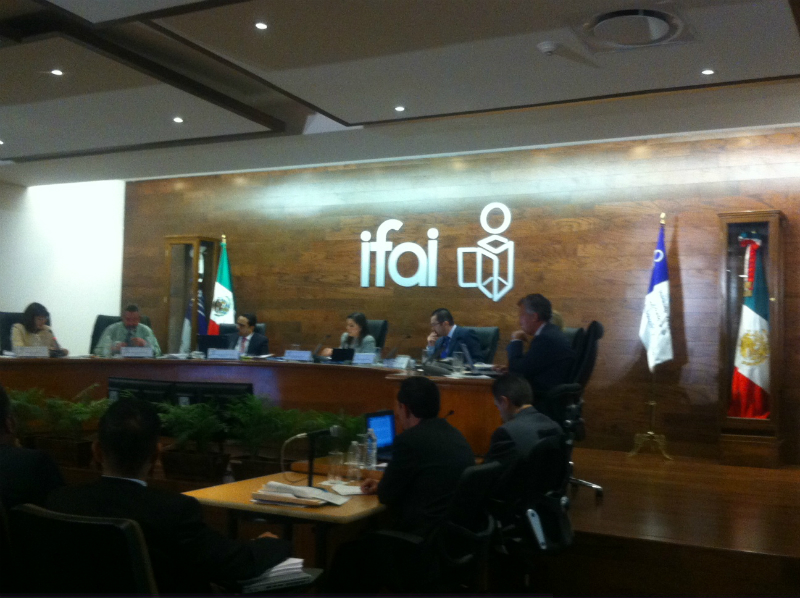
IFAI Plenary session. Photo by author, used with permission.
The battle over Mexico's new telecom law continues, with many citizens fearful that the law could bring censorship and increased levels of surveillance to digital communications in the country. Advocates are looking to Mexico's autonomous Federal Institute for Access to Public Information and Data Protection (IFAI) for help. But the Institute says it will not challenge the proposed law in court. (This paragraph was added to the English version of this post by its editor. Read the original Spanish version here.)
Last week, the IFAI voted not to challenge the constitutionality of several crucial articles in the country's new Telecommunications and Broadcasting Law, #LeyTelecom. The IFAI is the country's principal agency tasked with ensuring freedom of information and protecting the privacy of its citizens. But in a plenary session held on August 13, its members decided not to take their fight to the Supreme Court.
The telecom law and its subordinate legislation open the door to potential privacy violations by allowing the monitoring of calls and text messages without a court order. Many key features of the new law and the general discontent it has provoked across the country have been addressed in previous articles by Global Voices contributors, in particular Greg Epstein and Elizabeth.
In an important case of missed opportunity, the IFAI resolved not to use the powers conferred on it by President Peña Nieto's recent Constitutional Transparency Reform, which would allow the Institute to challenge the constitutionality of the new law. Of particular concern are those provisions in the legislation that grant the Mexican Attorney General —the office in charge of investigating and prosecuting federal crimes— authority to solicit real-time data on cellphone location, calls, and messaging from telecom service providers. Regarding this particular issue, Joel Salas Suárez, one of the seven members of the Institute commented:
El punto más sensible es que #LeyTelecom no establece mecanismos de control respecto de la actuación del ministerio público.
— Joel Salas Suárez (@joelsas) August 13, 2014
The most delicate point is that the #LeyTelecom does not establish oversight mechanisms to monitor the Attorney General's Office.
Nevertheless, in a split vote, the commissioners decided that in this instance they would not file an action before the Supreme Court to challenge the constitutionality of the law's most controversial articles. The decision generated indignation across the twittersphere.
Rodolfo Herrera Moro bluntly expressed his annoyance with the commissioners recently appointed to IFAI:
Chafísima @ifaimexico! Timoratos, no llenaron sus sillas. Igual que demás pusilánimes, hacen todo por no oponerse al poder. Que pena. #IFAIL
— Rodolfo Herrera-Moro (@herreramoro)
August 13, 2014
Incompetent and spineless @ifaimexico! You couldn't even fill the seats. Just the same as all the other cowards, doing everything to avoid speaking truth to power. What a shame. #IFAIL

Image from the author, used with permission.
Professor José Roldán Xopa also lamented the agency's decision:
Muy lamentable que el nuevo @ifaimexico tenga tan pronto una muestra de declive y deslegitimación social. Lamentable. #leytelecom
— José Roldán Xopa (@jrxopa) August 13, 2014
It is truly regrettable that right out of the gate the new @ifaimexico should display such a lack of civic will and legitimacy. Pathetic.
Twitter user Renata Terrazas had the following comment:
Es una lástima que el @ifaimexico esté por perderse la oportunidad de cumplir con su rol de órgano regulador del poder.
— Renata Terrazas (@Renaterra_zas) August 13, 2014
It is a shame that @ifaimexico is losing an opportunity to fulfill its role as a regulatory check on power.
Meanwhile, Madame Déficit rebuked Ximena Puente, a sitting commissioner and current president of the IFAI, wondering who would now defend citizens’ rights, since the Institute clearly refused to do so:
Si el #NuevoIFAI no puede defendernos de la arbitrariedad y abusos que fomenta la #LeyTelecom ¿quién podrá hacerlo? @XimenaPuente
— Madame Déficit (@Alessia_mx) August 13, 2014
If #NuevoIFAI can't protect us against the injustice and exploitation made possible by #LeyTelecom, who can? @XimenaPuente
Jorge Romero León brought up the fact that commissioner Puente had argued the IFAI lacked the legitimacy needed to call into question the legislation's constitutionality:
Y olviden todo lo que algún día dije admiraba a Ximena Puente… hay que ser muy cínicos para argumentar que no están legitimados.
— Jorge Romero León (@filosofaux) August 13, 2014
And forget I once said I admired Ximena Puente… they have to be pretty cynical to claim they aren't legitimate.
Twitter user Juan Manuel coined an ingenious anagram to clarify his own opinion of the agency by adding a letter to IFAI's initials:
El #NuevoIFAI cambia de nombre a #IFAIL al no apoyar acción de inconstitucionalidad de #LeyTelecom
— Juan Manuel (@jm_casanueva) August 13, 2014
#NuevoIFAI is changing its name to #IFAIL after refusing to support the action for a declaration of unconstitutionality against #LeyTelecom
Ironically, in a candid comment, legislator Laura Rojas, who recently participated in the Mexican Senate vote on #LeyTelecom, recognized the public's unease about the new law and its potential threat to individual privacy:
Hay serias preocupaciones sobre una posible violación a la privacidad por #ReformaTelecom. Debió decidir la Corte @ifaimexico
— Laura Rojas (@Laura_Rojas_) August 13, 2014
There are serious concerns about possible privacy violation by #ReformaTelecom. The Supreme Court should decide @ifaimexico.
Finally, renowned jurist Miguel Carbonell added his voice to the growing disaffection with the IFAI's decision:
El IFAI debería haber impugnado la #LeyTelecom para que la Suprema Corte resolviera su constitucionalidad. Lamento que no lo haya hecho.
— Miguel Carbonell (@MiguelCarbonell) August 13, 2014
The IFAI should have contested #LeyTelecom so that the Supreme Court could determine its constitutionality. I regret that they did not do so.
In the end, despite the controversy and mistrust it has generated among Mexicans, the so-called #LeyTelecom continues to gain traction.
UPDATE: Shortly after this post was published in Spanish, Mexican Senator Laura Rojas tweeted a direct response to the author:
@tadeo_rc yo la voté en contra. Saludos.
— Laura Rojas (@Laura_Rojas_) agosto 14, 2014
@tadeo_rc I voted against it. Regards.






